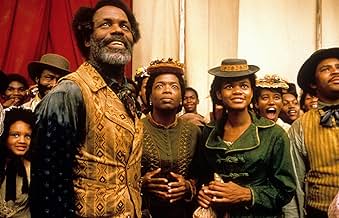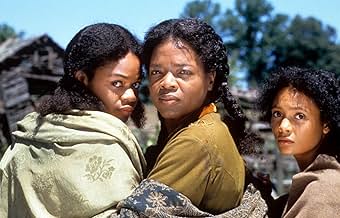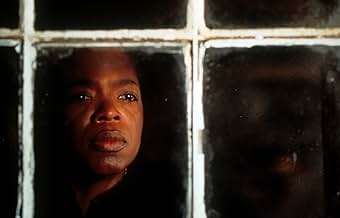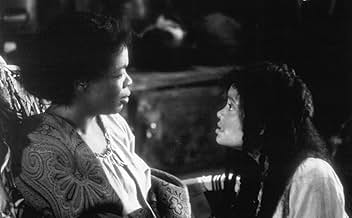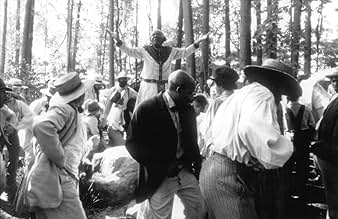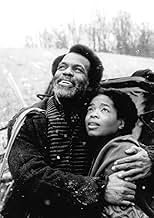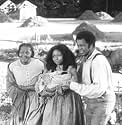IMDb RATING
6.1/10
9.7K
YOUR RATING
A slave is visited by the spirit of a mysterious young woman.A slave is visited by the spirit of a mysterious young woman.A slave is visited by the spirit of a mysterious young woman.
- Nominated for 1 Oscar
- 3 wins & 24 nominations total
Kessia Embry
- Amy Denver
- (as Kessia Kordelle)
LisaGay Hamilton
- Younger Sethe
- (as Lisa Gay Hamilton)
Thandiwe Newton
- Beloved
- (as Thandie Newton)
Storyline
Did you know
- TriviaThandiwe Newton's African first name means, interestingly enough, "beloved."
- GoofsIn the scene with a deer in the field, a car is visible driving by in the upper right hand corner.
- Quotes
Baby Suggs: And the beat, beat, of your heart... Love it. More than the lungs that need yet to breathe free air. More than the womb, which holds life. More than the private parts that give life. Love your heart. This... this is the prize. Amen. This the prize... Amen!
- Crazy creditsIn lieu of traditional opening credits, the movie begins with the camera moving through a cemetery to focus on a gravestone engraved with the sole word "BELOVED".
- Alternate versionsIn the version aired on television there is a deleted scene and two alternate scenes. The TV version also removes any mention of Sethe's sons. They don't exist in the TV version. The first alternate scene is when Paul D is telling Sethe about Halle being in the loft. In the theatrical you see Paul D quoting Halle. In the TV version there is a flashback to Halle (Hill Harper) saying "The loft." The second alternate scene in the prayer group discussing how to deal with Sethe being haunted by Beloved. In the theatrical there is a line about Sethe being like batter. In the Tv version that is removed and there is a line inserted from another woman saying "I don't mind a little communication between worlds but this is invasion" and another character says "we better get to work and pray" The deleted scene added for the TV version has Stamp Paid asking Paul D if beloved is his problem and not what Sethe did.
Featured review
Even though 'Beloved' got mixed reviews, I thought it was wonderful. All the performances were amazing and Jonathan Demme did a wonderful job. I think the best performances were from Oprah and Kimberly Elise. Beah Richards was exceptionally good in her small role as Baby Suggs. I have studied slavery in the past, and I knew it was very brutal. But if you pair this move with 'Amistad' you get the real picture of slavery and how horrible it was. Another good performance came from Lisa Gay Hamilton as younger Sethe, because she exemplified the true spirit of the hopeful slave. I would not recommend to those who have a faint heart or who get squeamish easily.
Details
Box office
- Budget
- $80,000,000 (estimated)
- Gross US & Canada
- $22,852,487
- Opening weekend US & Canada
- $8,165,551
- Oct 18, 1998
- Gross worldwide
- $22,852,487
- Runtime2 hours 52 minutes
- Color
- Sound mix
- Aspect ratio
- 1.85 : 1
Contribute to this page
Suggest an edit or add missing content



